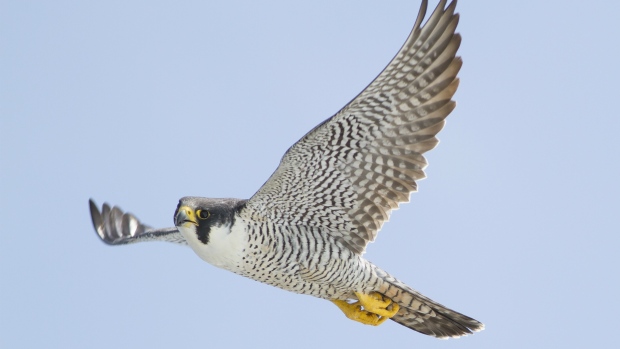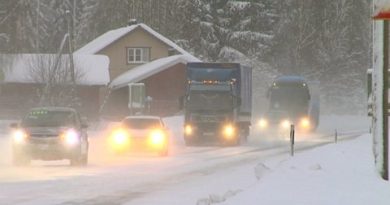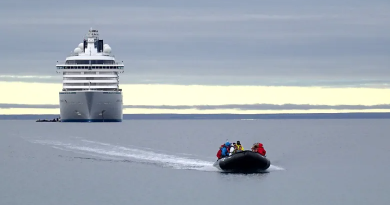Arctic rain threatens baby falcons

Warmer Arctic temperatures and changing weather patterns are introducing a new problem for peregrine falcons breeding on the west coast of Canada’s Hudson Bay: rain.
When it rains, adult falcons crouch above their chicks, wings spread like a canopy, to keep them dry. But warmer temperatures and more frequent heavy rains are, in some cases, forcing adults falcons to give up, leaving the chicks exposed in the nest.
The chicks can die from hypothermia, or even drown.
“They’re completely covered in fluffy down,” says Alastair Franke, of the University of Alberta’s Circumpolar Institute. “That down gets wet very quickly.”
Research in Nunavut
The latest research looked at 30 pairs of falcons near the community of Rankin Inlet in Canada’s eastern Arctic territory of Nunavut. It found that after a heavy summer rain, more than a third of the chicks died.
Researchers watched one case where a healthy adult mother saw her well fed chicks succumb to the cold and damp. When attempts to revive them with more food didn’t work, she killed and ate both chicks.
While infanticide is not uncommon in other raptor species, Franke says this is the first time it’s been documented in peregrine falcons.

“In extreme weather conditions where adults are exposed, at some point they give up,” Franke says.
He says this is done likely to save their strength for the next breeding opportunity.
What next?
The research found that offering protection to the falcons, in the form of nest boxes, made a difference, but some birds who used the nest boxes still died of starvation. That prompted concerns that heavy rainfall is also affecting creatures lower down the food chain, such as lemmings, ground squirrels and other birds.
Right now, Franke says, it’s not clear what action should be taken. The study was limited to one small population in a species that is, overall, doing very well.
Peregrine falcons were in steep decline in the 1970s because of the heavy use of pesticides such as DDT. Now peregrine falcons can be found around the globe.
However, one bird expert in Canada’s Northwest Territories says the plight of the falcons shows action needs to be taken on climate change.
“We are not doing much in response to climate change in terms of mitigating it or stopping the causes of it,” says Bob Bromley, a Yellowknife ornithologist and a member of the Northwest Territories legislature.
“They are sort of a canary in a coal mine,” Bromley says.
Related Links:
Hundreds of dead seabirds wash ashore on Alaska island in Bering Sea, Alaska Dispatch
Flame retardants found in Arctic gulls, Eye on the Arctic



